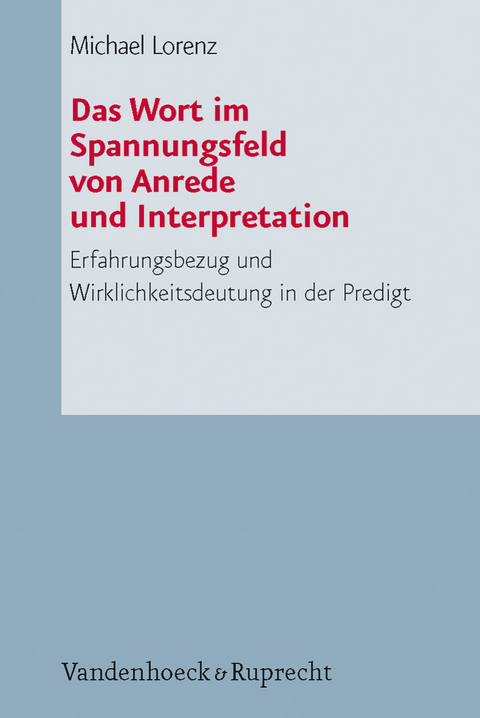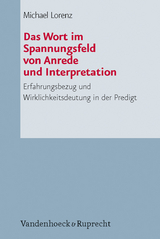Das Wort im Spannungsfeld von Anrede und Interpretation
Erfahrungsbezug und Wirklichkeitsdeutung in der Predigt
Seiten
2011
Vandenhoeck & Ruprecht (Verlag)
978-3-525-62415-9 (ISBN)
Vandenhoeck & Ruprecht (Verlag)
978-3-525-62415-9 (ISBN)
»Und was hat das mit mir zu tun?«
"What does the sermon have to do with my life?" Many listeners experience the sermon as stereotypical lingo or all too colloquial. Good homiletics can help to fight this problem by showing how the Word of God and human language interact, making the experiencing of God with all its life-changing power a plausible and effective event.Michael Lorenz introduces us, first, to the homiletics of Hans-Rudolf Müller-Schwefe from the 1960s, who emphasized the character of language as an act of appellation; and second, the semiotic homiletics of Wilfried Engemann, who thought of language as communication. His analysis of these two approaches shows the (unsolved) difficulty of combining the Word of God and language without allowing an unconnected juxtaposition or a powerless identity to arise - both of which encompass the difficulties of the sermon in homiletic theory.From here Lorenz describes the intertwining nature of the Word of God and language by linking it to the insights of the hermeneutic theology of Gerhard Ebeling. In contrast to subject-object relations, interpersonal relationships play a major role, as seen in the writings of Martin Buber and Gabriel Marcel. Thus, on the basis of a relational ontology the author develops hermeneutic homiletics oriented to differentiating between law and gospel and combining the theological core questions of the sermon with the practical matters of preaching.
"What does the sermon have to do with my life?" Many listeners experience the sermon as stereotypical lingo or all too colloquial. Good homiletics can help to fight this problem by showing how the Word of God and human language interact, making the experiencing of God with all its life-changing power a plausible and effective event.Michael Lorenz introduces us, first, to the homiletics of Hans-Rudolf Müller-Schwefe from the 1960s, who emphasized the character of language as an act of appellation; and second, the semiotic homiletics of Wilfried Engemann, who thought of language as communication. His analysis of these two approaches shows the (unsolved) difficulty of combining the Word of God and language without allowing an unconnected juxtaposition or a powerless identity to arise - both of which encompass the difficulties of the sermon in homiletic theory.From here Lorenz describes the intertwining nature of the Word of God and language by linking it to the insights of the hermeneutic theology of Gerhard Ebeling. In contrast to subject-object relations, interpersonal relationships play a major role, as seen in the writings of Martin Buber and Gabriel Marcel. Thus, on the basis of a relational ontology the author develops hermeneutic homiletics oriented to differentiating between law and gospel and combining the theological core questions of the sermon with the practical matters of preaching.
Michael Lorenz ist Pfarrer der evangelischen Kirchengemeinde St. Markus in Weiden.
Michael Lorenz develops a theory of sermon that focuses on the relation between the word of God and the human language because a sermon should express the existential importance of the gospel for our life. Lorenz refers to hermeneutical theology and the philosophy of Buber and Marcel.>
| Erscheint lt. Verlag | 17.8.2011 |
|---|---|
| Reihe/Serie | Arbeiten zur Pastoraltheologie, Liturgik und Hymnologie ; Band 069 |
| Verlagsort | Göttingen |
| Sprache | deutsch |
| Maße | 155 x 232 mm |
| Gewicht | 453 g |
| Themenwelt | Geisteswissenschaften ► Religion / Theologie ► Christentum |
| Schlagworte | Evangelische Predigt • Homiletik • Praktische Theologie • Predigt |
| ISBN-10 | 3-525-62415-8 / 3525624158 |
| ISBN-13 | 978-3-525-62415-9 / 9783525624159 |
| Zustand | Neuware |
| Haben Sie eine Frage zum Produkt? |
Mehr entdecken
aus dem Bereich
aus dem Bereich




